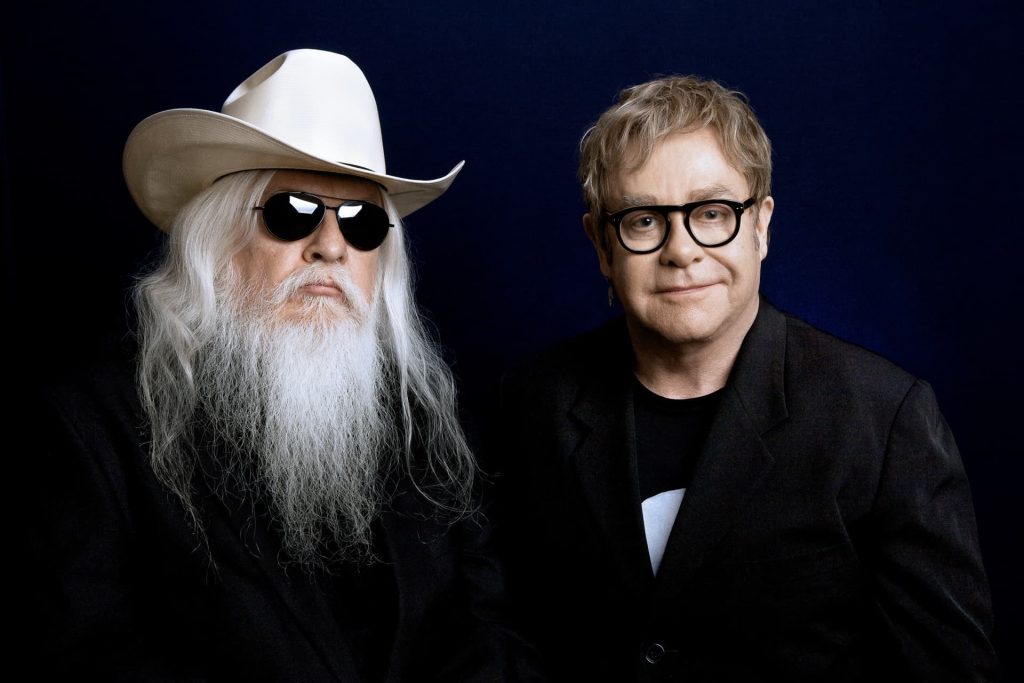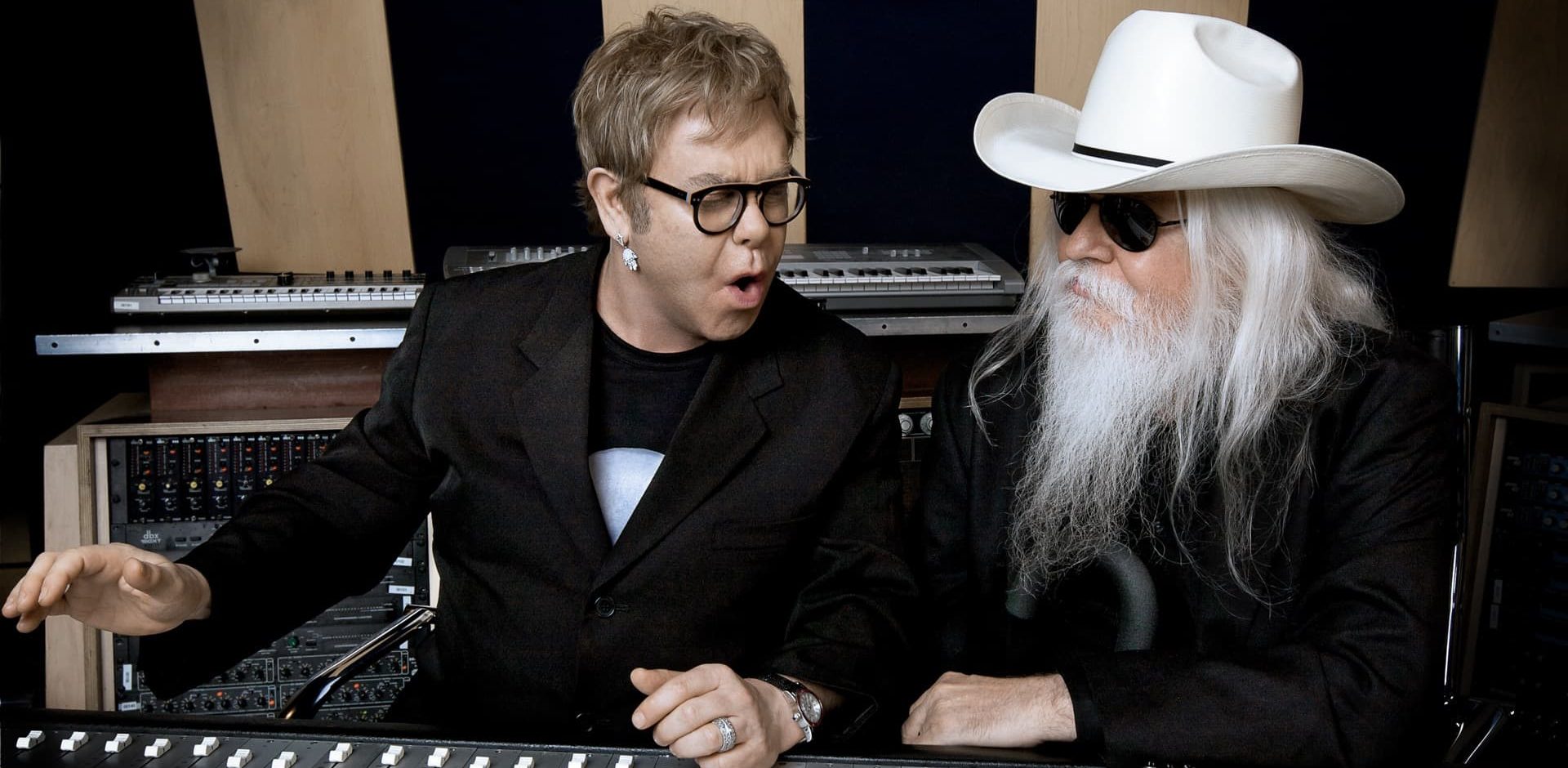Menu
In Honor of Leon Russell (1942-2016)
It was the most magical of times because here was my idol accepting me. Actually, he could eat me for breakfast [playing piano]. I came from England and being a huge fan of someone like him and to have him accept me and kind of take me under his wing and be really fantastic to me the whole time.It meant the whole world to me that someone could show me that generosity that you admired so much. It helped validate me by saying, "Well if he thinks I’m alright then I must be alright because he’s my hero."

Elton and Leon Russell in 2010. (Photo: Joseph Guay)
Leon, who passed away on November 13 at the age of 74, had a four-decade wide dovetail relationship with Elton. In the 1970s, the pianist and singer from Oklahoma was a major influence on the product-of-Pinner’s early piano playing style and song-writing. In recent years, Elton used his passion for his early mentor to record an album together and get Leon’s name back into the music lexicon…eventually resulting in a Top Five album and Leon’s induction into the Rock and Roll Hall of Fame.
At the time of their first meeting, on August 26, 1970 at the Troubadour nightclub in Los Angeles when Leon was in the audience during Elton’s United States debut, one of the two pianists had already written two hit songs, played on over a dozen Top 40 records, and was at the beginning of a six-year run where ten of his albums appeared on the Billboard Top 100 charts – including one live album and one greatest hits collection.
And the other one was Elton John.
Each man had, within the preceding few months, released an eponymous album to critical acclaim. The lead-off songs on these two LPs had remarkably similar titles (Your Song and A Song For You) and would soon become standards in each artist’s respective catalogues.
Elton was, to say the least, intimidated when he noticed Leon in the audience at the Troubadour.
Elton: I saw him and my knees went zzzippp!. He invited me up to his house and I thought he’s going to invite me up there and tie me to a chair and whip me and say, “This is how to play the piano!” I was really scared. I (had) heard the Delaney and Bonnie album [1969’s Accept No Substitute, which featured Leon Russell on piano] and I just went through the roof. I nearly retired at that point. I figured there wasn’t much point in playing anymore. (Interview by Mike Quigley and Rick McGrath for The Georgia Straight – Vancouver, Canada, April 1971)
Leon Russell: We’d been trying to get Elton for Shelter Records [the US record company started by Russell in 1969], but we were about a week late. I knew about him before he came to America; I had heard him with Long John Baldry. I sat down in the first row at the Troubadour, and he was brilliant.
Sometime after the first Troubadour show, Elton and Bernie came over to my house. They were both very shy and very English, and Elton told me I looked like a proper rock star. They liked a sign I had above the piano saying “Don’t Shoot The Piano Player.” I think maybe that was where they got the idea for that album title.
The two soon found themselves at the pair of pianos Russell had in his home, where he and Elton unsuspectingly set the table for their 2010 collaboration, The Union, four decades before the album was even dreamed of.
But let’s not get ahead of ourselves. During Elton’s second US tour, just a couple of months after the Troubadour shows, he opened for Leon at a series of concerts including four shows in two days at the Fillmore East in New York City. During Elton’s set Leon came on stage to add guitar to the nine-minute-long jam at the end of Burn Down The Mission (perhaps the most Leon-influenced song in Elton’s repertoire). Later in the show, Elton returned the favor by joining his idol on stage during Leon’s encore of Roll Away The Stone. “There was never any hint of competition,” Elton explained on Spectacle. “It was always camaraderie.” A close friendship, one based on mutual respect and a love of music, was formed by way of 176 piano keys.
Elton and Leon in early days. (Photo: Andy Dalton)
At the time, Leon had been working professionally for half of his twenty-eight years and was at the top of the must-call lists for the musicians and producers looking for a piano player to be the backbone of their studio or live bands. In the years prior to 1970, for example, Leon had recorded extensively as a member of Phil Spector’s “wall of sound” ensemble and had recently headed Joe Cocker’s landmark “Mad Dogs and Englishmen” band during their landmark tour and live album. A year after Elton’s Troubadour shows, Leon would be a major factor in George Harrison’s “Concert For Bangladesh,” which Elton calls, “One of the best live concerts ever.”
Over the next few decades, Elton rocked the Westies, called it the blues and found “The One”…and although he continued to champion Leon during interviews and in concert (his cover of A Song For You was a highlight of his 1986 world tour), the superstar lost contact with his mentor as their career trajectories veered off in dramatically different directions.
Fast-forward nearly forty years. The passage of time has propelled Elton into a level of success and popularity that few artists have been able to reach, let alone maintain. For Leon, the years were not quite as kind. Not to say that he was not still releasing albums, he was. And not to say that the only measure of success for such endeavors are hit singles and chart positions, they are not. For example, Leon won a Grammy and other industry awards in 1980 for his collaboration with Willie Nelson, One For The Road. But even the average music aficionado who had continued to buy records that were made by musicians playing actual instruments had not necessarily put the latest Leon Russell record at the top of their Christmas wish list. As Leon said in Cameron Crowe’s 2012 documentary The Union, “I was broke for a long time.“
In 2008, Elton found himself answering a question about Leon Russell from Elvis Costello on the first episode of Spectacle: “Piano playing-wise I’d say he’s my biggest hero.” Later on in the program, Elton went over to the piano and vamped, giving the audience a one-minute lesson on Leon’s playing style.
Nine months after “Professor John” taught “Leon Russell 101” in New York City that afternoon, he and his partner David Furnish were on safari in South Africa. David, having been inspired by hearing such passionate talk about an artist he was unfamiliar with, had Leon’s Retrospective playing on his iPod. As Elton listened to the music he began to cry. When David asked what the matter was, Elton said, “His music takes me back to one of the most beautiful and fantastic times of my life.” Overwhelmed by memories of his friend – his talents and kindness – he became frustrated that, “people have forgotten how wonderful this man’s music was.” And the door that had been unlocked almost a year before with Costello’s question, “You knew Leon Russell, didn’t you?” suddenly burst wide open.
When moved this deeply, Elton is a man who wastes zero time. He immediately telephoned his manager, got Leon’s number, and a call was placed from South Africa to Tennessee. Elton and Leon began the process of catching up after 35 years, and a reunion was in the making. No mention, however, was made of anything more, but as soon as Elton hung up he turned to David and said, “You know, that is not the reason I called him.”
Within a moment, Elton got the number of premiere record producer T Bone Burnett and very soon a phone was ringing in Los Angeles. Elton recounted the story of his emotional reaction to Leon’s music and asked the Grammy-winner if he would be interested in producing an Elton John and Leon Russell duet album. Thinking it sounded like “a killer-great idea,” T Bone agreed immediately. When later asked if there was a moment during the project when he thought this was a really good idea, T Bone said, “Yeah…when Elton called.”
With Burnett on board, Elton phoned Leon right back and told him of his idea for them to record an album together. Leon’s reaction was perhaps the last thing Elton expected him to say, “Do you think I can do it?” The role-reversal was complete; Elton found himself in the position of validating the talents of the same man who had given him the confidence he needed in 1970. After Elton’s assurances, and learning that T Bone would be producing, Leon gave into fate and said, “Let’s do it!”
Writing sessions for The Union began 39 years to the day after Elton and Leon’s debut at the Fillmore East, and the album’s recording began in January 2010. On the 29th of that month, Elton and Leon performed Helpless during the GRAMMY MusiCares tribute to Neil Young. That night, after the show, Leon wrote the words to The Union’s closing song, a loving tribute to Elton and then-manager Johnny Barbis called In The Hands Of Angels. “That’s what happens when you save peoples’ lives,” Leon explained as he wrote the music the next day in the studio. By the time the song ended, Elton was reduced to tears.
Elton came and found me in the ditch on the side of the highway of life and took me up to the high stages and treated me like a king.
I’m proud of Leon for coming back and proving to us all what a wonderful and incredible artist he is.
The Union was released in October 2010, entering the Billboard album charts at number three, and Rolling Stone named it one of the top five albums of the year. Elton and Leon played 30 concerts together in the US and London starting on October 19, 2010, and ending with an appearance on Saturday Night Live on April 2, 2011.
On March 14 of that year, Elton inducted Leon into the Rock and Roll Hall of Fame at the annual ceremony in New York. In speaking about the recipient of the “Award for Musical Excellence” award, Elton said:
[During The Union sessions] I said to him, “There’s one thing I want for you. I want people to acknowledge you for what you have done, to remember you for what you’ve written – what you’ve played on, and for you to be proud again of what you’ve done. And I want you to be in the Rock and Roll Hall of Fame.” And here we are a year later, and he’s in the Rock and Roll Hall of Fame.
Upon learning of Leon’s passing, Elton (since named an honorary pallbearer for Leon’s funeral) wrote on his Instagram:
“My darling Leon Russell passed away last night. He was a mentor, inspiration and so kind to me. Thank God we caught up with each other and made ‘The Union’. He got his reputation back and felt fulfilled. I loved him and always will. #LeonRussell #RIP #TheHandsOfAngels”

Elton and Leon in the studio, 2010. (Photo: Joseph Guay)
(Excerpts from previous EltonJohn.com news items and Elton John tour programs were used in this article.)
